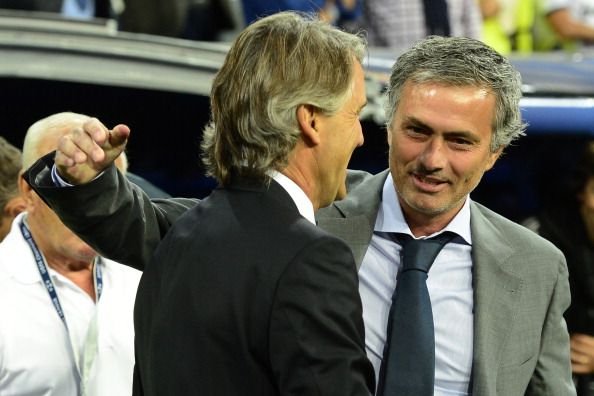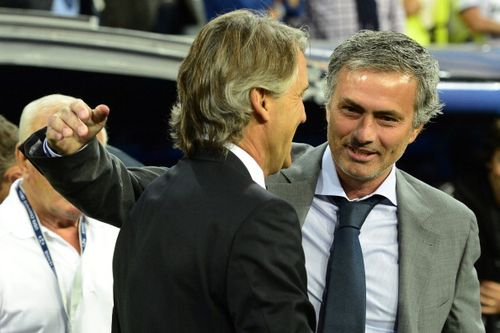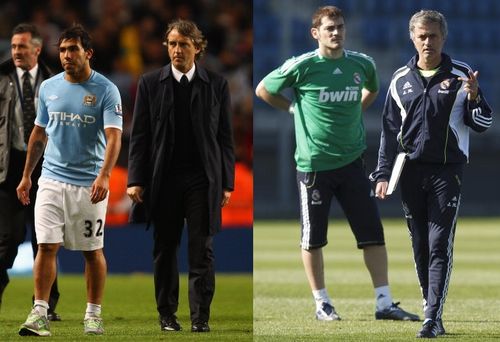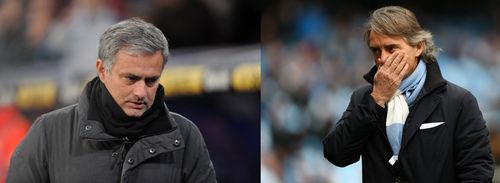
Jose Mourinho and Roberto Mancini: Two sides of the same coin

As different as chalk and cheese, and yet the same
I began writing this as an article on Mourinho’s period at Madrid. Halfway through, something struck me: his tenure resonates completely with Mancini’s at Manchester City, manifested in every result they’ve drawn! If one were to analyze their tenures at Real Madrid and Manchester City, one would realise that both managers are in fact two sides of the same coin. Let’s take a (tongue-in-cheek) look at their last few seasons below:
Initiation
Our story starts in scenic Milan. Both Jose Mourinho and Roberto Mancini presided over Inter Milan’s golden era in the 2006-10 period. Both men had by then built a reputation as cup specialists by making it a point to go after less attractive domestic silverware – Mancini repeatedly won the Coppa Italia during his time at Sampdoria and Inter, and Mourinho targeted the League Cup throughout his Chelsea tenure.
In 2010, both men arrived at clubs that promptly gave them a wad of cash and encouraged them to spray it around. They were riding a tidal wave of expectations at clubs that wanted results quickly and wanted to oust a specific rival. Typically, both men revelled in their role as king-makers who were handed the key to the treasury.
Mancini went berserk, buying big names and lesser ones from every club in a 360-degree line of sight – Toure, Milner, Silva, Balotelli. Meanwhile, Mourinho was more selective as Real Madrid had already done the big buying the previous season – Ronaldo, Kaka, Xabi Alonso and, err, Arbeloa – so he went specifically after big-name Germans, and ejected potentially divisive figures such as Raul and Guti.
That’s the difference between Mourinho and Mancini – for all his faults, Mourinho is a hands-on manager who pays attention to the dressing room atmosphere. That is also Mancini’s weak area – for all his tactical brilliance, his indifference towards his playing staff is evocative of a cold, distant landlord supervising his farmers at work. If one were to consider the stereotype of a chummy, jovial manager who goes out drinking with the lads, Mourinho would fit the bill perfectly, and Mancini would be at the opposite end of the spectrum.
But I’m digressing. Let’s move on.
2010-11: Domestic Cups
In their first seasons, both were contending with entrenched opponents in the league. Barcelona were at the peak of their powers and gunning for another treble. Chelsea had won a domestic double, and Manchester United were desperate to reclaim the title. As ambitious as both men were, the chances of a first-season title looked bleak against such formidable foes, so they settled for their speciality: cup-chasing.
They won the premier domestic Cup in their first season (FA Cup and King’s Cup respectively), and it was the first time either club had won the trophy in decades (Madrid since 1993, City since 1976), leading to immediate adulation from their respective fan-bases. They both also beat the eventual league champions along the way. It was a sweet triumph for both men – and also a very necessary one, seeing that the title chase had gone awry and they would probably have been sacked had they ended the season without a major trophy.

Captain and coach: Not a very happy combination in both cases
But our brave voyagers were by now starting to experience rumblings of dissent – Mancini from his captain Carlos Tevez, who was homesick and wanted out, and Mourinho from his squad’s Spanish players, who were uncomfortable with the large Portuguese contingent he was installing at Madrid and with his take-no-prisoners style of dealing with the media. But both men papered over these minor cracks and prepared to launch a league assault the next season.
2011-12: The Great Home Run
With an admirably exact congruence of mentality, the two men focused on winning their home games. This tactic pitchforked their teams to the top of the table at the start of the campaign, and they stayed there, utterly dominating the first half of their respective league seasons. They finished the season with 50+ points out of a possible 57 at home.
Both were clearly targeting the league and focusing on scoring as many goals as possible in each game to put their title rivals under pressure. As pundits correctly proclaimed, both chases would be decided by whoever scored more.
Then came the domestic Cup – a tournament both had won last time around – but here they ran into their title challengers, who were wiser after the previous season’s defeat. Both men were unlucky this time around and exited the tournament.
As the run-in to the title progressed, there were hiccups. Tevez went on strike, and Mancini was without his captain. This left the Italian with a depleted strike force (depleted further if you consider Balotelli’s propensity to get sent off for the sheer fun of it). Mourinho had seen a revolt of his own – the famous training-ground flare-up where Sergio Ramos pointedly told him, “You’ve never been a player yourself, so you wouldn’t understand.”
Both were dropping points left, right and centre. The title chase(s) looked in threat. Eulogies were penned. ‘Manager Wanted’ adverts were readied.
And then, with one spectacular win over their principal opponents, they were back on track. Real won their title in the first week of May, and City followed suit a week later in the most dramatic fashion possible.
2012-13: Endgame

And it all went downhill from here on forward…
After a strangely underwhelming summer, where more high-profile names exited than joined, the season restarted. Both of them won their respective Supercup/Community Shield matches to kick off on a high.
However, ground was conceded very quickly in the league, and soon Real Madrid were trailing the leaders by about 13 points. Manchester City matched that margin by February. As calls grew for both managers to be sacked, the proverbial skeletons began stampeding out of multiple cupboards. Mancini had no control over his squad and was over-reliant on Aguero, it was muttered. Mourinho had started a civil war at Real Madrid and upset the entire Spanish gang, it was whispered. Like a game of Chinese Whispers, the rumours were probably distorted and then amplified to the point where they scarcely resembled the original story, but our two lead protagonists began to feel the pressure. The title chases were unofficially conceded in March.
There was still time for one last act of defiance. Real defeated Barcelona at the Camp Nou in March. City matched that with a win at Old Trafford in April. Both were final charges and utterly irrelevant to the outcome of the title race, but neither was looking at that race any longer. It was time for a final hurrah: the domestic Cup final.
And with the perfect harmony borne of years of practice, both contrived to lose their finals to unfancied opponents. A season that began in a blaze of glory as league defending champions ended as a damp, trophyless squib. A few hundreds of millions later, Mancini and Mourinho managed 3 trophies each during their stints.
Real life is truly stranger than fiction, isn’t it?